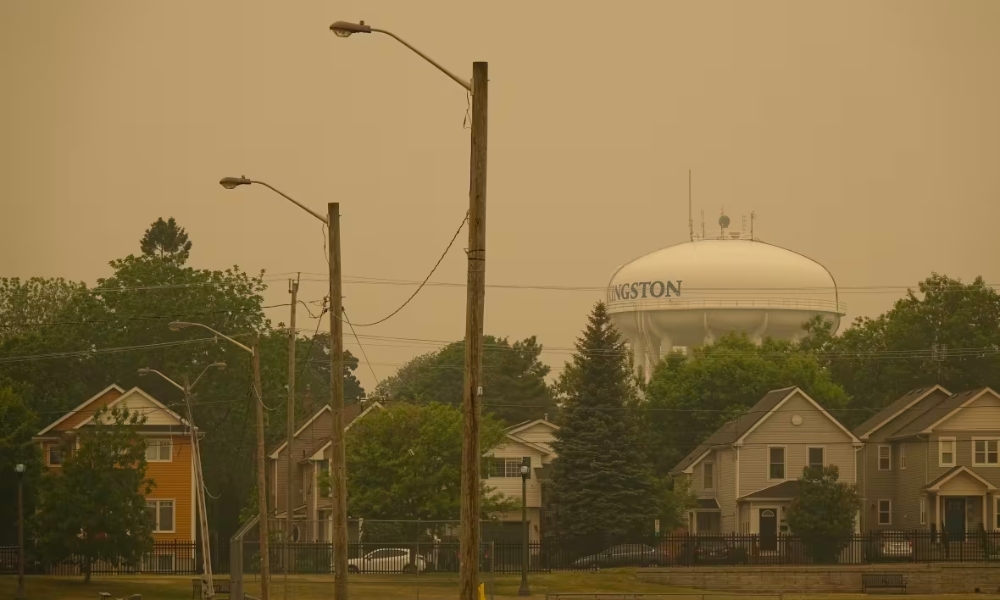With wildfires burning in Quebec and across Canada, millions of people across North America woke up this morning to an eerie red sun and smoke-filled air.
As of this morning Kingston, Ontario, where I live, had some of the worst air quality in North America.

Kingston, Ontario has been shrouded in wildfire smoke this week.
It’s just as bad in Ottawa, where my parents, sister, aunts and uncles live. Forecasts predict that over the next few days, half of Canada’s population will be exposed to dangerously polluted air, a toxic mix of particles and other pollutants that can cause serious health issues, especially among children and older adults. The weather app on my phone had an ominous message this morning: “worst air quality in a lifetime for many.”
If you’re looking for good advice on protecting yourself and your loved ones from wildfire smoke, here are some resources that may be helpful:
Tips & Resources for staying safe
- Check the air quality index before planning extended outdoor activities.
- Avoid unnecessary outdoor exposure, especially if you have a respiratory condition. If you must go outside, wear a high-quality mask or ventilator like a KN95.
- Keep windows closed, seal gaps or cracks in windows or doors, and consider running an air purifier with a HEPA filter or setting up a DIY air cleaner if possible.
- Monitor your symptoms closely. While some mild effects of smoke exposure can be self-managed, the Government of Canada recommends talking to a healthcare provider if you experience dizziness, chest pains, severe cough, shortness of breath, wheezing (including asthma attacks), or heart palpitations (irregular heart beat).
- Stay well-hydrated by drinking plenty of water to help flush toxins from your system.
- Stay informed about local evacuation orders or warnings issued by authorities. Follow their instructions promptly and be prepared to evacuate if necessary.
- Prepare an emergency kit with essential supplies, including medications, a first aid kit, and food and water, in case of evacuation or prolonged exposure to smoke.
Additional Resources:
- How to better protect yourself from the health effects of wildfire smoke
- Children and Wildfire smoke
- Government of Canada: Get Prepared
Fundraisers to support impacted communities
While those of us in urban areas try our best to protect ourselves and our loved ones from toxic smoke, rural and Indigenous communities caught in the path of these out-of-control wildfires have been forced to flee for their lives.
For those wondering how you can help, here’s a list of community-led fundraisers and calls for mutual aid. Please give generously if you can.
- Odawa Native Friendship Centre is collecting donations for First Nations community members that have recently been evacuated (specify “Wildfire Evacuees” in the ‘send a message to this charity’ text box)
- GoFundMe for Grassy Narrows First Nation to rebuild a fire escape route damaged by flooding
- Algonquins of Barriere Lake requesting funds for families who are being evacuated – donations can be sent to [email protected]
We know the situation is changing quickly so we’re updating this list as we learn more — please email [email protected] if you’re aware of other fundraisers, particularly Indigenous and community led ones, that we can lift up.
If you’re as concerned about the climate crisis as I am, you might feel a little numb when yet another extreme weather event makes the news. But this situation is truly unprecedented. Right now, major fires are burning in every province and territory except PEI and Nunavut. The number of fires and area burned is 13 times the 10-year average for this time of year.
I know moments like these can be hard. I’ve certainly felt my share of dread and climate anxiety over the past few days. But knowing that thousands of you are reading this, and taking action together to win the systemic changes we need, gives me the hope and motivation to keep going.
Today, Prime Minister Trudeau held a press conference where he warned Canadians that this will likely be the worst summer of wildfires on record. It’s terrifying to think that this is only the beginning if we stay the course of climate inaction.
What’s worse is that the Trudeau government is still spending billions of our tax dollars on subsidies for the fossil fuel companies responsible for this crisis.
Thanks for staying connected. We will keep this blog updated. If you have suggestions for resources or fundraisers we should share, please send us an email at [email protected].
In solidarity,
Chris Gusen
Canada Senior Digital and Communications Specialist, 350.org